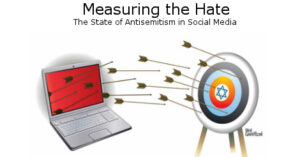This article is an extract based on OHPI’s Annual Report for the 2016 Financial Year. Return to the Report.
 On Holocaust Memorial Day, 27 January 2016, we publicly released the world’s first large scale empirical report on hate speech in social media titled “Measuring the Hate: The State of Antisemitism in Social Media”. It was prepared by OHPI on behalf of the Global Forum to Combat Antisemitism which is managed by the antisemitism department within the Israeli Foreign Ministry. This followed an interim report on antisemitism released the previous year.
On Holocaust Memorial Day, 27 January 2016, we publicly released the world’s first large scale empirical report on hate speech in social media titled “Measuring the Hate: The State of Antisemitism in Social Media”. It was prepared by OHPI on behalf of the Global Forum to Combat Antisemitism which is managed by the antisemitism department within the Israeli Foreign Ministry. This followed an interim report on antisemitism released the previous year.
The report is based on over 2,000 items of antisemitism gathered across Facebook, YouTube and Twitter. It provides a breakdown of the antisemitism into 4 categories, traditional antisemitism, new antisemitism, Holocaust denial and promotion or incitement to violence. Within each category it gives a breakdown by platform as well as three examples from each platform for each category. Most significantly, for the first time this report tracked how the social media companies were responding over a 10-month period. Overall the report shows that only 20% of the antisemitic content had been removed after the end of the 10 months. The rate at which platforms would remove the antisemitism varied greatly depending on both the platform and the type of antisemitism. The extremes were violence related content on Facebook where after 10 months 75% of it had been removed (the best case) through to New Antisemitism on YouTube where after 10 months only 4% of it has been removed.
The report was published on the Israeli Foreign Ministry website as well as the OHPI website and has had significant traction both in the media and within expert circles. On the OHPI site the page about the report has been liked or shared 4,700 times in social media and a pdf of the report on Scribd has been viewed over 8,200 times. Data from the report has been used by news sources including The Australian, The Sydney Morning Herald, Haaretz, and The Forward.
The report, its publication through the Israeli Government and the use of the data within media articles, all advance OHPI’s goal of promoting the prevention of abuse and better control of abusive behaviour through education, research, and by stimulating debate on online hate, the prevention of online hate, and on the link between online hate and emotional and physical abuse. They also advance our long term goal of being a world leader in combating online hate and a critical partner who works with key stakeholders to improve the prevention, mitigation and responses to online hate.
Share this important work:
Please help us continue to combat the growing problem of antisemitism in social media. Please support this ground-breaking work.
This article is an extract based on OHPI’s Annual Report for the 2016 Financial Year. Return to the Report.
